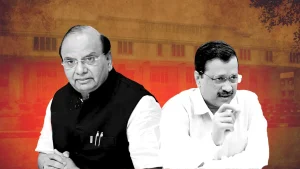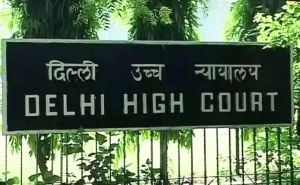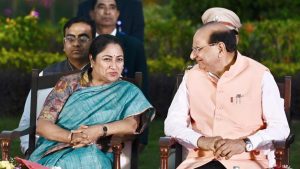New Delhi – The ongoing L-G vs Govt. tussle in Delhi, a protracted battle that has been simmering for several years, finally came to an end with a decisive court ruling. On Wednesday, the Delhi High Court closed the legal proceedings surrounding the dispute that had begun during the tenure of the previous AAP-led government. The newly elected BJP government notified the court that it had decided to abandon all actions against senior bureaucrats involved in inquiries before the Committee of Privileges of the Legislative Assembly, thereby concluding a contentious chapter in Delhi’s governance history.
Also Read: Delhi Haat Fire: Devastating Blaze Destroys 30 Stalls in Popular Market
Seven Years of Legal Conflict: The L-G vs Govt. Tussle
The legal battle began in 2018 when Chief Secretary Anshu Prakash alleged he was assaulted by AAP MLAs Amanatullah Khan and Prakash Jarwal during a late-night meeting at the Chief Minister’s residence. This incident sparked the L-G vs Govt. tussle and set the stage for deepening tensions between the AAP-led Delhi government and the administrative officers, leading to a series of legal disputes. Prakash’s complaint of assault led to a police investigation, during which the two MLAs were briefly jailed.

However, the AAP-controlled Delhi Assembly’s privileges committee issued breach of privilege notices to Prakash and several other senior bureaucrats in retaliation for the FIR filed. Prakash, in turn, moved the High Court, challenging the actions of the committee as politically motivated. His petition highlighted the escalating L-G vs Govt. tussle and sought to protect the bureaucrats from harassment.
Court’s Intervention and the Interim Arrangement


The Delhi High Court stepped in during 2018, urging the officials to appear before the committee as required. However, the court also introduced an important safeguard. It clarified that any punitive measures taken by the privileges committee would not be enforced while the petitions remained under judicial review. This arrangement created a delicate balance in the L-G vs Govt. tussle, with bureaucrats attending committee meetings but shielded from immediate punitive actions.
Despite the court’s intervention, the tussle between the elected government and civil servants persisted. The L-G vs Govt. tussle became symbolic of the larger power struggle between the Delhi government and the bureaucracy, with tensions peaking over the following years. The case appeared to be stuck in a constant state of limbo, as neither side seemed willing to back down.
The Role of the New BJP Government in Ending the Tussle
The L-G vs Govt. tussle took a significant turn with the formation of a new BJP-led government in Delhi earlier this year. On March 27, 2025, the newly constituted Assembly made it clear that it would adopt a different approach toward the bureaucratic conflict.


The Deputy Secretary (Legislation) communicated to the government’s counsel that the Assembly had decided to cease any further action on matters that were pending before the Committee of Privileges. This announcement effectively brought an end to the L-G vs Govt. tussle by signaling that no further legal or legislative actions would be taken.
The BJP government’s decision to abandon the legacy cases related to the L-G vs Govt. tussle marked a crucial policy shift. For nearly seven years, the dispute had been a central theme in Delhi’s political landscape, defining the relationship between the bureaucracy and the elected government. The BJP’s decision was seen as an attempt to reset this relationship and move beyond the divisive legacy of the previous government.
Complexity in Transition and Policy Reversal
A procedural complication emerged in the L-G vs Govt. tussle during the transition between the Seventh and Eighth Legislative Assemblies. The outgoing AAP government had adopted motions to ensure the continuation of investigations into matters pending before various committees. However, the new BJP-led Assembly rejected these motions, emphasizing that it was not in favor of continuing the legislative actions from the previous administration. This rejection marked another important step in ending the L-G vs Govt. tussle.
The Speaker of the Assembly reiterated this position, arguing that many of the pending issues had been unresolved for a long time and that no recent committee meetings had been held to discuss them. The Speaker also pointed out that the ongoing litigation in the Delhi High Court over the L-G vs Govt. tussle had been detrimental to effective governance. As a result, the BJP government wanted to “start afresh,” free from the political ramifications of past disputes.
A Shift in Governance Philosophy
The BJP government’s decision to end the L-G vs Govt. tussle and withdraw from the legacy cases reflects a broader shift in governance philosophy. The new government views these proceedings as politically motivated, rather than as legitimate legislative oversight. According to the Speaker, the L-G vs Govt. tussle had been a source of unnecessary conflict and had undermined the smooth functioning of the administration.
By abandoning the privilege proceedings, the BJP government has signaled that it intends to foster a new working relationship between the elected government and the bureaucracy, free from the friction and adversarial dynamics that defined the previous administration. The hope is that this new approach will help in normalizing relations and creating a more collaborative environment for governance.
Implications for Delhi’s Unique Governance Model
The resolution of the L-G vs Govt. tussle could have significant implications for Delhi’s governance structure, which is unique in its dual reporting system. Bureaucrats in Delhi report to both the elected government and the Lieutenant Governor, creating a complex dynamic. By halting the privilege proceedings, the BJP government is signaling a desire for a more streamlined relationship between these two branches of governance.
Analysts believe that the end of the L-G vs Govt. tussle could strengthen bureaucratic autonomy in Delhi’s governance framework. This may allow civil servants to work more effectively without the constant pressure of political conflicts. Moreover, it may set a new precedent for how governance and the bureaucracy interact in the capital, which has been historically marked by power struggles and litigation.
Bureaucrats’ Relief and the End of Legal Uncertainty
For the bureaucrats involved in the L-G vs Govt. tussle, the conclusion of the legal proceedings offers much-needed relief. Former Chief Secretary Anshu Prakash and other senior officials can now move forward without the shadow of the privilege proceedings hanging over them. The closure of their petitions signifies the end of an era characterized by prolonged uncertainty.
The L-G vs Govt. tussle had profoundly affected Prakash’s tenure as Chief Secretary. The assault incident and its aftermath were emblematic of the larger breakdown in relations between Delhi’s bureaucracy and the AAP-led government. With this legal conflict now resolved, Prakash and other bureaucrats can finally put the matter behind them.
The Road Ahead: A New Era of Bureaucratic Relations?
With the L-G vs Govt. tussle officially concluded, the focus now shifts to how the new BJP government will manage its relationship with the bureaucracy in the future. The decision to abandon legacy cases suggests a desire for a fresh start, with less emphasis on contentious political issues.
The future of Delhi’s governance will likely depend on how well the new government can navigate the complexities of bureaucratic management. As the L-G vs Govt. tussle fades into history, the relationship between elected officials and civil servants will continue to evolve, and all eyes will be on how this new dynamic shapes the functioning of the capital’s administration.
In conclusion, the L-G vs Govt. tussle ends in Delhi not just with the resolution of legal proceedings, but also with a shift in governance philosophy. The political landscape has changed, and Delhi’s bureaucracy can now look forward to a less divisive and more collaborative future under the new government.

